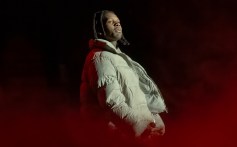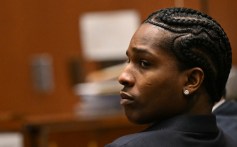Legal
Page: 4

Trending on Billboard
Lil Durk says his lawyers have been unfairly “kept in the dark” about death threats that were called in to a judge and the lead prosecutor in his murder-for-hire case.
Attorneys for the Chicago drill star argue in a Thursday (Nov. 13) court filing that they just learned about a seven-month-long FBI investigation into these threats, and that this concealment has severely prejudiced the rapper (Durk Banks) as the clock ticks towards a January trial date. Durk is accused of ordering members of his Only the Family (OTF) crew to shoot his rival, Quando Rondo, in 2022.
Related
The case is being prosecuted in Los Angeles federal court and chiefly overseen by U.S. District Judge Michael Fitzgerald, though Magistrate Judge Patricia Donahue handled Durk’s failed attempt to be released on bail this spring. According to Thursday’s filing, a Durk supporter left four voicemails for Judge Donahue in February with “explicit death threats” related to the charges against him and other OTF members.
The caller allegedly mimicked the sound of gunfire in his messages and said in one message, “If they get life, I’m going to burn this [expletive] down. I’m talking ’bout the world, and I’m going to burn it, burn it to the ground.”
Durk’s lawyers say that in April, a separate caller phoned the case’s lead prosecutor, Ian Yanniello, with more death threats. This person also allegedly threatened courthouse staff and other prosecutors in the U.S. Attorney’s Office for the Central District of California.
According to Thursday’s filing, prosecutors and court staff conferred about these death threats, and the FBI investigated the matter extensively. But the defense lawyers say they weren’t clued in until just last month, which they claim is a huge problem.
Related
“This prolonged nondisclosure — compounded by undisclosed ex parte communications between the prosecution team and the bench about these threats — has irreparably compromised the structural integrity of these proceedings,” reads the filing.
Durk’s lawyers say these death threats could have improperly influenced prosecutors’ decision-making, as well as Judge Donahue’s May ruling that Durk would be a danger to the community if released from jail.
“To state the obvious, Judge Donahue was in no position to consider whether Mr. Banks was too dangerous to be released while having been both personally threatened by someone purporting to act on Mr. Banks’ behalf, and having had her entire workplace physically and violently threatened by the same,” write the rapper’s attorneys.
Durk’s team says the situation has “fatally compromised” his right to a fair trial, which is just two months out. They’re asking that the entire case be dismissed, or at the very least, that the trial be pushed back and reassigned to both a different court and a separate branch of the U.S. Attorney’s Office.
Related
A spokesperson for the prosecution declined to comment on the matter. Reps for the Los Angeles federal courthouse did not immediately return a request for comment.
Durk was arrested last year for allegedly putting a bounty on Rondo’s head. A 2022 shooting at a Los Angeles gas station left Rondo (Tyquian Bowman) unscathed, but Rondo’s friend Lul Pab (Saviay’a Robinson) was killed in the crossfire.
The Chicago rapper denies ordering the hit and says there’s no real evidence against him. The case’s first indictment included lyrics from Durk’s song “Wonderful Wayne & Jackie Boy,” but those were later removed after defense lawyers noted that the song was written months before the Rondo attack.
Trending on Billboard
ABKCO, a music company that owns The Rolling Stones‘ early catalog, has brought a lawsuit against Behr Paint over an Instagram advertisement that allegedly used an unlicensed version of the band’s “Paint It, Black,” which ABKCO calls “one of the most valuable copyrights in the history of popular music.”
The copyright infringement case, filed on Wednesday (Nov. 12) in federal court, centers on a 2022 Instagram ad for Behr that showed a person spray-painting furniture while “Paint It, Black” played in the background. ABKCO claims Behr didn’t pay for the track.
Related
While individual social media users can soundtrack their videos for free with songs covered by blanket licenses, companies are required to buy so-called sync licenses for music in commercial advertisements. ABKCO’s lawsuit says it regularly sells sync licenses for “Paint It, Black” — and collects fees ranging from the hundreds of thousands to millions of dollars for the song, which hit No. 1 on the Billboard Hot 100 in 1966.
“Behr’s commercial use of the ABKCO recording has forced a business association upon ABKCO that has harmed its ability to license the ABKCO recording to Behr’s competitors that would pay for the use of the ABKCO recording,” writes lawyer Benjamin Akley of Pryor Cashman. “Clearly, the ABKCO recording is not only iconic, it has unique and particular value to a paint company seeking to promote its paint products.”
According to the lawsuit, ABKCO didn’t learn about the 2022 ad until this past summer. ABKCO’s attorneys allegedly notified Behr, leading the paint company to take down the video, though the company “was unwilling to engage in further dialogue concerning its unauthorized use,” the lawsuit claims.
Related
ABKCO claims Behr is a “sophisticated, multi-billion-dollar corporation” that knows the rules around sync licenses, yet it “inexplicably” chose not to follow those rules here. Now, the lawsuit is seeking financial penalties for Behr’s alleged copyright infringement.
“As a result of the aforementioned acts of infringement, ABKCO has suffered significant damages,” reads the complaint.
Reps for Behr did not immediately return a request for comment on the lawsuit on Thursday (Nov. 13).
Trending on Billboard
Sean “Diddy” Combs’ release date has been pushed back, a move that comes after media reports that he violated prison rules by drinking homemade alcohol.
After Diddy was convicted in July on federal prostitution charges and sentenced to four years in prison, the federal Bureau of Prisons inmate records initially projected his release date as May 8, 2028. But those same records, reviewed by Billboard, now say Diddy will go free on June 4, 2028.
Related
It’s unclear why the expected date was updated; such listings are just estimates, reflecting the “inmate’s projected release date based on BOP calculations.” But it comes after Combs allegedly violated multiple prison rules within weeks of arriving at a New Jersey federal correctional facility.
As first reported by CBS News, Combs faced potential disciplinary action for an unauthorized three-way phone call, which is barred by prison rules. His representative denied any wrongdoing to CBS, saying there “was nothing improper” about the call.
According to a report last week by TMZ, Combs was also caught in prison with homemade alcohol made from Fanta soda, sugar and apples. Combs’ family strongly denied that report, saying on social media that it was “completely false.”
In a statement to Billboard, a BOP spokesperson declined to comment on why Diddy’s date had been changed: “For privacy, safety, and security reasons, we do not discuss the conditions of confinement for any individual, including release plans, timing, or procedures, or whether a particular individual is the subject of allegations, investigations, or sanctions. However, we can tell you that Sean Combs has a projected release date of June 4, 2028.”
Reps for Combs did not immediately return requests for comment on the reasons for the changed release date.
Combs was arrested and charged in September 2024 with racketeering (RICO) and sex trafficking violations over claims that he ran a sprawling criminal operation aimed at facilitating “freak-offs” — elaborate events at which he allegedly forced ex-girlfriend Cassie Ventura and others to have sex with male escorts while he watched and masturbated.
Following a blockbuster trial this spring, jurors issued a verdict clearing Combs on the more serious charges that could have seen him sentenced to prison for life. But he was still convicted on two lesser counts for transporting Ventura and others across state lines for the purpose of prostitution. Last month, he was sentenced to 50 months in prison.
Combs is currently appealing both his convictions and sentence; if successful, he could get out much earlier than the BOP estimates. But the appeals process is often slow, and Combs will likely serve a sizeable chunk of his term before the case is even decided. The star is also seeking a pardon from President Donald Trump, but the White House has publicly denied that it is considering that move.
Trending on Billboard
A new lawsuit claims Drake’s ”What Did I Miss?” music video ripped off the work of an Italian photographer — and, in a strange twist, that the rapper was intentionally trying to connect his feud with Kendrick Lamar to a controversial Balenciaga campaign.
The copyright infringement complaint, filed against Drake (Aubrey Graham) on Wednesday (Nov. 12) in federal court, alleges a key sequence in the “What Did I Miss?” video lifts from a photograph in Gabriele Galimberti’s 2020 book The Ameriguns. Both Galimberti’s photo and the scene in question show men standing outside houses, surrounded by firearms laid out in parallel around swimming pools.
Related
Galimberti is a photographer with National Geographic, though he is perhaps best known for shooting a notorious 2022 Balenciaga campaign that portrayed children with sexually explicit objects. The campaign drew a huge backlash, with consumers accusing the fashion house and Galimberti of glorifying pedophilia.
Wednesday’s lawsuit draws a direct line between the Balenciaga controversy and “What Did I Miss?,” in which Drake addressed the aftermath of his rap battle with Lamar. That feud ended with Lamar calling Drake a “certified pedophile” on the chart-topping diss track “Not Like Us,” leading Drake to sue Universal Music Group (UMG) for defamation.
“Plaintiff was ultimately publicly vindicated in a defamation lawsuit abroad related to the false accusations arising from the Balenciaga advertisement,” writes Galimberti’s attorney. “Given Kendrick Lamar’s lyrics…calling defendant Graham a pedophile and defendant Graham’s now dismissed defamation lawsuit, on information and belief, defendant Graham sought to imply that he, like plaintiff, would be publicly exonerated.”
Related
Drake’s defamation lawsuit was dismissed last month, with a federal judge ruling that lyrics in rap battles are hyperbole and not meant to imply facts. Drake is now appealing to revive the case against UMG, which owns both Lamar’s label Interscope Records and his label, Republic Records.
Republic and UMG are both defendants in Galimberti’s lawsuit as well, along with Drake and his company OVO Sounds. Galimberti is seeking financial damages for what he describes as “both an egregious violation of federal law and an affront to plaintiff, his livelihood, his legacy and to photographers everywhere.”
“Plaintiff is a serious professional, addressing serious themes,” reads the complaint. “His work hangs in galleries, museums, graces serious print literature, and his career depends upon the respect and admiration of dealers, collectors and critics of contemporary and documentary art. By the forced and unauthorized association of his work with the infringing video, the integrity of his work and his reputation as a photographer has been damaged.”
Reps for Drake and UMG did not immediately return requests for comment on the lawsuit.
“What Did I Miss?” debuted at No. 2 on the Billboard Hot 100 in July, and hit No. 1 on both Hot R&B/Hip-Hop Songs and Rhythmic Airplay, extending multiple Billboard chart records for the rapper.
Trending on Billboard
In the wake of Calvin Harris’ bombshell fraud claims against business manager Thomas St. John, fellow star DJ Eric Prydz has brought a lawsuit alleging the financial adviser stole $269,000 from his accounts.
St. John, the head of beleaguered entertainment industry accounting firm Thomas St. John Group, was accused in arbitration this summer of secretly funneling $22 million from Harris’ accounts into a real estate side venture. St. John denies the claims, maintaining that the Scottish DJ was an informed and willing investor in the project.
Related
Now, Prydz — another titan of the EDM industry — says St. John exploited his account access to steal money. The Swedish DJ, who has been a client of St. John’s since 2012, claims in an Oct. 28 breach of contract and fraud lawsuit that St. John paid himself $269,000 in commissions for services Prydz says he never asked for or authorized.
“Thomas St. John is a professional financial advisor who is supposed to be trustworthy and reliable, and who should be acting in the best interests of his client,” wrote Prydz’s attorney, Carla Wirtschafter of Reed Smith. “TSJ, however, proved to be none of those things. Instead, he is a fraud who not only abuses the trust of his clients, he takes money from them without their knowledge or authorization for his personal use and benefit.”
The lawsuit claims Prydz decided to fire St. John in September after discovering that the manager had taken $219,000 in unearned commissions on top of his regular 5% fee. St. John allegedly agreed to stay on through the end of October to finish a tax return for Prydz, though this process quickly turned contentious.
Prydz claims St. John tried to “extort” an additional $150,000 out of him and refused to complete the tax return otherwise, which Prydz says he refused. But according to the lawsuit, St. John unilaterally took another $50,000 out of Prydz’s accounts to cover part of this improper fee.
Related
The legal complaint alleges that after all this, St. John never filed the tax return as promised — and that he’s now refusing to turn over the necessary documentation to Prydz’s new financial advisers.
“As a direct result of TSJ’s malicious conduct to hold Prydz’s financial documents hostage, Prydz has been unable to complete and file the now past due tax forms,” the lawsuit reads.
Prydz is seeking a court order for St. John to release his financial records and return the allegedly stolen commissions. The DJ also wants additional monetary damages recouping St. John’s 5% fee, claiming the adviser did “little or no work” to earn those payments.
Reps for St. John did not immediately return a request for comment on Wednesday (Nov. 12).
Prydz’s lawsuit is just the latest legal woe for St. John, whose U.S. business arm has been in bankruptcy since March. The manager’s real estate project, a Hollywood development called CMNTY Culture Campus, is the subject of claims from both Harris and songwriter Philip Lawrence.
Related
A deep dive by Billboard last month reported that CMNTY Culture — originally envisioned as a recording studio and creative office complex — was born out of the St. John-advised, $90 million sale in 2020 of Lawrence’s catalog of Bruno Mars writing credits.
Following that deal, Lawrence opted to park some of the proceeds in a real estate venture to lessen his taxes on the sale and brought on St. John as a partner. But Lawrence’s finances soon dried up, and St. John ended up buying out the songwriter and helming the project himself.
It was at this point that St. John took on outside investors, including Harris. But while St. John claims Harris wanted in on CMNTY Culture, Harris alleges in his arbitration that the manager fooled him into signing investment documents without knowing what they were.
Harris now claims that his money has disappeared and that CMNTY Culture is a “complete boondoggle.” Indeed, St. John is no longer developing a recording studio and has yet to break ground on any construction, though he maintains that the project is still on track for success under reworked plans for a residential apartment complex.
The Harris action is still pending before a private arbitrator. Meanwhile, Lawrence has declared bankruptcy, while his estate trustee recently accused St. John in court papers of violating their fiduciary relationship during the CMNTY Culture partnership.
Trending on Billboard
An appeals court has upheld Tory Lanez’s convictions for shooting Megan Thee Stallion, rejecting his arguments aimed at overturning his 10-year prison sentence.
Nearly three years after the singer (Daystar Peterson) was found guilty in 2022 of shooting Megan in the foot during a drunken argument on a Hollywood Hills street, a California appellate court affirmed the verdict in a ruling issued Wednesday (Nov. 12).
Related
Lanez and his supporters have long maintained his innocence, claiming there was insufficient proof that he was the shooter and that he received an unfair trial. But in the ruling, the appeals court said there was no reason to undo the verdict.
“Peterson contends the trial court committed a number of errors,” the appeals court wrote. “We find no prejudicial error and, accordingly, affirm Peterson’s conviction.” A spokeswoman for Lanez did not immediately return a request for comment on the ruling.
The ruling came more than five years after the July 12, 2020, shooting, which happened as a driver was shuttling Lanez, Megan and her assistant/friend Kelsey Harris from a party at Kylie Jenner’s house. According to prosecutors, when Megan got out of a vehicle and began walking away, Lanez shouted “Dance, b—h!” and fired a gun at her feet, striking her once.
Following the incident, Megan initially told police officers that she had cut her foot stepping on broken glass, but days later alleged that she had been shot. Lanez was eventually charged with the shooting in October 2022.
Related
During a blockbuster trial in Los Angeles court, Lanez’s lawyers tried to sow doubt over who had really pulled the trigger, painting a scenario in which Harris could have been the shooter. But a key defense witness offered confusing eyewitness testimony, and prosecutors pointed to an earlier interview in which Harris pinned the blame squarely on Lanez. Megan herself offered powerful testimony that Lanez had been the one to shoot her, and neither Lanez nor the driver took the witness stand.
Lanez and his supporters have refused to accept that verdict, calling it a “miscarriage of justice.” His legal team has filed multiple forms of appeal to challenge the verdict, each of which has now been rejected. They have also claimed publicly that new evidence exonerates him; Megan’s reps and prosecutors strongly deny that.
On appeal, Lanez raised a slew of arguments. He argued it had been unfair for jurors to hear the earlier interview with Harris, in which she placed the blame for the shooting on Lanez; he also argued prosecutors had improperly cited an Instagram post in which he appeared to say that Harris had not shot Megan.
In Wednesday’s decision, the appeals court rejected each of those arguments, including Lanez’s claim that prosecutors had “introduced racial bias into the proceedings” by referencing a tattoo of a gun on his chest.
“It was defense counsel who asked — both on direct and on redirect — if [a witness] had ever seen Peterson with a gun,” the appeals court wrote. “Neither of the prosecutors even mentioned Peterson’s tattoos — much less the tattoo of a firearm — in their closing arguments.”
Trending on Billboard
There’s a new front in the nasty legal war between hip-hop producer Madlib and his longtime manager Eothen “Egon” Alapatt: The many songs recorded during their decade-long partnership.
In a lawsuit filed Tuesday (Nov. 11) against Madlib (Otis Lee Jackson Jr.), Egon asked a federal judge to decide who owns the rights to the masters created over the years at their Madicine Show label — tracks that feature Madlib’s beats under vocals by Mac Miller, Freddie Gibbs, Four Tet and others.
Related
“Jackson now claims those works as his personal property and seeks to withdraw them entirely from Madicine Show’s catalog,” writes Egon’s attorney Kenneth Freundlich. “That is not how the law works.”
In a statement to Billboard, Madlib responded to Egon’s new claims: “I trusted someone who didn’t value the art the way I do. This is a reminder that not everyone who stands beside you is standing for you. When you move with truth, you don’t have to defend yourself. Time and integrity do the talking.”
Madlib, a critically-acclaimed producer known for his work with Kanye West (now Ye) and the late MF Doom, went to court first in 2024 — accusing Egon of “rank self-dealing” and “pervasive mismanagement.” The case, filed in California state court, claimed the manager had abused his power over Madicine Show to profit at Madlib’s expense.
Egon hit back in May, filing a countersuit blasting Madlib for “having the audacity to bring this mean-spirited personal action.” In one notable claim, Egon said Madlib’s new label was interfering with music projects that legally belong to Madicine Show, including the release of a years-old recording of the late Miller that has long been rumored to be in the works.
Related
In the new case on Tuesday, Egon said he needed “immediate federal intervention” in that legal battle because of a key new development in the earlier lawsuit.
Last month, a Los Angeles judge sided with Madlib and ruled that a court-appointed receiver should oversee the corporate dissolution of Madicine Show. The ruling came over objections from Egon, who said he himself should oversee the company’s wind-down. “Defendant is not the appropriate person to oversee the dissolution process,” the judge said at the time. “The court will appoint a receiver.”
But now, weeks later, Egon says in his new lawsuit that the breakup process cannot move ahead until it’s clear who owns the company’s “most valuable assets”: its catalog of recorded music. And since copyright law is handled exclusively by federal courts, he says that decision must be made by a U.S. district judge.
“The recordings at issue were created and exploited pursuant to a licensing relationship between Jackson and Madicine Show,” Egon writes. “They remain company assets, and their ownership must be determined under the Copyright Act.”
Related
According to the lawsuit, the tracks recorded by Miller and others over Madlib’s beats were “facilitated, supervised, and produced” by Egon under a longstanding arrangement in which the company controlled them. The producer’s recent claim that “he alone owns all copyrights” is “mystifying” and legally incorrect, the suit says.
“This position ignores the parties’ mutual understanding and Alapatt’s creative, financial, and managerial contributions,” Egon’s lawyers write. “After benefiting from that arrangement, Jackson cannot revoke or withdraw those rights or claim exclusive ownership of works that were created, produced, and marketed under Madicine Show’s direction.”
Attorneys for both sides did not immediately return requests for comment on the new case.
Trending on Billboard
After losing their legal battle against ADOR, the members of NewJeans have decided to resume activities with the label.
On Wednesday (Nov. 12), ADOR announced that K-pop stars Haerin and Hyein had agreed to continue working with the HYBE subsidiary after “thoughtful consideration with their respective families and thorough discussions” about how to move forward.
“The two members have decided to respect the court’s latest ruling and adhere to their exclusive contract with the label,” the company wrote in a statement shared with Billboard. “ADOR is committed to providing its full support to HAERIN and HYEIN to ensure the seamless continuation of their artistic endeavors.”
“We request the warm support from the fans and respectfully urge you to avoid engaging in unfounded speculation regarding the members,” ADOR added.
Other outlets are reporting that the remaining members, Minji, Hanni and Danielle, have also agreed to continue working with the label. Billboard has reached out to HYBE for comment.
News of NewJeans’ return comes a year after the members first announced plans to leave ADOR and release music independently, alleging that the label had violated their contract by firing their mentor, former CEO Min Hee-jin. This past October, a Korean judge sided with ADOR’s stance that the termination of Min was not sufficient grounds to void the band’s contract, upholding that NewJeans may not pursue any independent activities until 2029.
“We sincerely hope that today’s judgment, which comes after long-term verification of various claims and facts and reaffirms prior rulings, will serve as an opportunity for the artists to calmly reflect on this matter,” ADOR said in a statement following its victory. “As we stated during the trial, we have completed preparations for the artist’s activities, including the release of a studio album, and are waiting. We will do our utmost to return to the fans through discussions with the artist.”
Since forming in 2022, NewJeans has released a number of singles and two EPs, including 2nd EP ‘Get Up’, which debuted at No. 1 on the Billboard 200. The group has also charted five songs on the Billboard Hot 100.
In 2025, Minji, Hanni, Danielle, Haerin and Hyein began releasing music and performing under the name “NJZ.” They were ordered to stop doing so after ADOR filed a preliminary injunction, and in June, they were each fined $734,000 for “unauthorized activities.”
Trending on Billboard
A$AP Relli has abandoned plans to retread his shooting claims against A$AP Rocky at a second trial early next year, telling Billboard through a lawyer that he’s instead “focusing on rebuilding his life.”
Rocky (Rakim Mayers) was acquitted at a criminal trial this past February of shooting Relli (Terrell Ephron), his childhood friend and onetime A$AP Mob collaborator, in 2021. Relli brought an assault lawsuit in 2022 seeking financial damages from the star rapper over the same alleged incident.
Related
The civil case was scheduled to go to trial in January, with Relli facing a lower burden of proof than the one prosecutors failed to meet in their criminal case against Rocky. But an attorney for Relli, Aaron Morris, tells Billboard on Tuesday (Nov. 11) that his client has decided to drop the assault claims.
“At this point, he’s ready to simply move on from the shooting,” Morris said. “The ordeal has been a nightmare for him, and the statements calling him a ‘liar’ and worse effectively eliminated his chances of a career in the industry.”
Morris said his team will file court papers officially dismissing the assault lawsuit later this week. Relli is still pursuing a separate defamation lawsuit against both Rocky and his lawyer, Joe Tacopina, over press interviews in which they called the shooting claims “extortion” and a “get-rich-quick-scheme.” Relli alleges these statements harmed his reputation and career as an artist manager.
“He’s going to litigate the defamation action because of the damages it caused, but as to the shooting, he’s thankful he wasn’t hurt worse and is focusing on rebuilding his life,” says Morris.
Rocky’s reps did not immediately return a request for comment.
Rocky and Relli were involved in a now-infamous altercation near a Hollywood hotel in November 2021. Relli alleges Rocky fired a handgun at him twice during the argument, while the rapper maintains it was a prop gun filled with blanks.
Prosecutors charged Rocky with two felony assault counts in 2022. The Grammy-nominated Harlem rapper rejected a plea offer from prosecutors and went to trial, risking a maximum of 24 years in prison if convicted. Rocky’s bet ultimately paid off, with a Los Angeles jury fully acquitting him of both counts.
Trending on Billboard
A new lawsuit alleges Downtown Music Holdings threw a licensing partner under the bus as a “sacrifice” to lessen regulatory scrutiny of its controversial acquisition by Universal Music Group (UMG).
The $375 million complaint, filed on Monday (Nov. 10) in Manhattan federal court, centers on Downtown’s relationship with YouTube music provider Blast Off Media. According to the lawsuit, Downtown unlawfully ended its distribution contract with Blast Off — and destroyed an entire music catalog in the process — over concerns regarding the European Commission’s review of Downtown’s proposed $775 million merger with UMG’s Virgin Music Group.
Related
“This case exemplifies precisely the type of conduct that opponents of the UMG/Downtown acquisition warned about: a major-label-owned entity destroying an independent operator’s business when it became inconvenient, using pretextual compliance concerns as cover for bad faith economic motivations,” writes Blast Off’s lawyer, JP Kernisan of Quinn Emanuel.
In a statement provided to Billboard on Tuesday (Nov. 11), a Downtown spokesperson said the company properly terminated the Blast Off contract upon realizing that Blast Off’s music catalog was being “widely leveraged to monetize reused or unlicensed content on YouTube.”
“We will defend ourselves vigorously against these baseless and frivolous claims,” the Downtown spokesperson added.
Blast Off’s business model centers on a library of roughly 800 free backing tracks on YouTube. The company allows creators to add these songs to their videos, then runs advertisements on the content and shares music royalties with the creators. Blast Off signed a distribution deal with Downtown in August, tapping the indie music heavyweight to run point on monetizing its sound recordings and navigating YouTube’s copyright claims process.
Related
But Downtown ended the contract after little more than a month in early October amid what it said were concerns about supposed copyright infringement in videos that used Blast Off’s music. However, Blast Off alleges in Monday’s lawsuit that this was an “absurdly disproportionate” reaction to just two user-generated videos that were flagged and quickly dealt with.
“Defendants failed to identify any wrongdoing by Blast Off as opposed to by third-party content creators over whom Blast Off has no control [and] ignored Blast Offs extensive good-faith compliance efforts, including proactive identification and removal of problematic content and implementation of Al-powered monitoring systems,” reads the complaint.
Blast Off alleges that Downtown’s “true motives” in terminating the contract were tied to regulatory approval of the UMG merger; according to the complaint, Downtown needed to maintain favorable “compliance optics” to get the deal through.
“Any issues with its key platform partner YouTube — whether legitimate or not — could negatively impact the acquisition,” writes Blast Off’s counsel. “Downtown preemptively chose to sacrifice Blast Off’s rights rather than work through routine compliance matters out of an abundance of caution to protect its larger financial interests during a sensitive period.”
Related
The “catastrophic” result of all this, claims the lawsuit, is that Downtown has since delisted the entire Blast Off catalog from YouTube. This is allegedly depriving Blast Off of more than $40,000 in revenue per day — and worse, the company says, its music library now carries a “permanent stigma” and will never bounce back to its original worth.
Blast Off estimates its financial damages to be at least $375 million, citing a $250 million valuation for its catalog before the delisting. The company is accusing Downtown of fraudulent inducement and breach of contract, among a slew of other civil claims.
Downtown’s spokesperson denies all of Blast Off’s allegations and maintains that the contract termination was “appropriate and necessary” after they “determined that BlastOff Media’s content was in flagrant violation of YouTube’s terms of service.”
According to Downtown’s reps, the issues with Blast Off went far beyond just two YouTube videos, as the lawsuit claims. They say instead that Downtown determined, via a thorough review, that a significant amount of the videos incorporating Blast Off’s music were unoriginal or unlicensed, and that, in some cases, the music was embedded inaudibly, thus monetizing ineligible video content in violation of YouTube’s content policy.
“Downtown is proud to uphold the highest trust and safety standards on behalf of our clients, our partners and the broader industry,” said the company’s spokesperson. “This includes our role as one of the founders of the Music Fights Fraud Alliance, which was launched to help combat content abuse, including the parasitic exploitation exemplified by Blast Off Media.”

 State Champ Radio
State Champ Radio 









